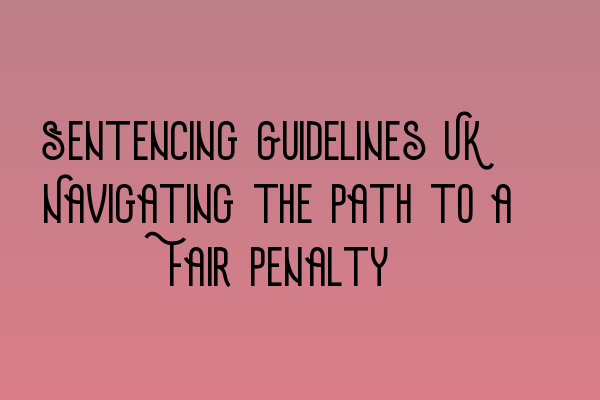Sentencing Guidelines UK: Navigating the Path to a Fair Penalty
When it comes to criminal law, understanding the sentencing guidelines in the UK is essential for both legal professionals and individuals involved in legal proceedings. The sentencing guidelines provide a framework for judges and magistrates to determine appropriate penalties for various criminal offenses. Navigating this path can be complex and challenging, but with the right knowledge and expertise, you can ensure a fair and just outcome.
The Importance of Sentencing Guidelines
Sentencing guidelines play a crucial role in promoting consistency and transparency in the criminal justice system. By providing a set of principles and factors that must be considered during sentencing, these guidelines help to ensure that similar offenses are treated equally and that the punishment fits the crime. They also serve as a reference point for legal professionals, allowing them to make informed arguments and decisions in their cases.
Understanding the Sentencing Process
The sentencing process in the UK is a complex and multifaceted one. It involves a careful assessment of various factors, including the seriousness of the offense, the harm caused to the victim, and the culpability of the offender. The guidelines provide clear instructions on how these factors should be taken into account when determining the appropriate penalty.
Factors Considered in Sentencing
When considering the appropriate penalty for a specific offense, the court takes into account several factors, including:
- The nature and severity of the offense
- The harm caused to the victim
- The offender’s level of culpability
- Any aggravating or mitigating factors
- The offender’s previous criminal record
- The impact of the offense on the community
By considering these factors, the court aims to ensure that the punishment is fair, proportionate, and reflective of the individual circumstances of the case.
Challenges in Sentencing
While sentencing guidelines provide a valuable framework for determining penalties, there are challenges that legal professionals may face. One such challenge is the interpretation and application of the guidelines. As the guidelines are not rigid rules, but rather principles to be applied flexibly, there can be room for interpretation. This can lead to differing opinions and potential disparities in sentencing outcomes.
Seeking Expert Legal Representation
When facing a criminal charge, it is crucial to seek expert legal representation to navigate the complexities of the sentencing guidelines. Having an experienced solicitor who understands the guidelines and can effectively argue for a fair penalty is essential. At SQE Criminal Law & Practice Law UK, our team of expert solicitors is well-versed in the intricacies of the sentencing process and can provide you with the guidance and support you need.
With our expertise, we can help ensure that your case is presented in the best possible light, taking into account all relevant factors and making persuasive arguments to secure a fair and just verdict. We are committed to fighting for the rights of our clients and ensuring that they receive the best possible outcome.
If you require legal representation or would like to learn more about navigating the sentencing guidelines in the UK, contact us today. Our team of expert solicitors is ready to assist you.
Related Articles
For more information on relevant topics, be sure to check out these articles:
- Legal Representation for Delaware LLCs in the UK: Expert Advice
- SQE Exam Prep: Essential Study Materials for Aspiring Solicitors
- Expert Testimonies in UK Courts: Building Strong Cases
- Demystifying the Solicitors Qualifying Examination Format
- SQE Exam for International Lawyers: Challenges and Success Strategies
